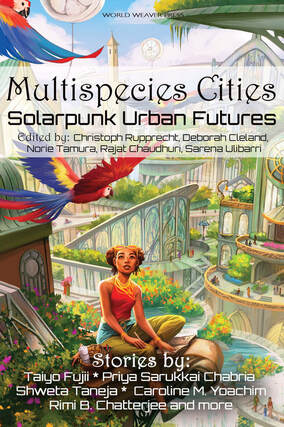 Guest Blog by E.-H. Nießler There is something special about Solarpunk. It marries the fantastical with musings about 'what could be' in a way that used to be the sole domain of Science Fiction, back in the days when the genre was being defined. Yet it doesn't really concern itself with the insignificance of our existence on a cosmic scale or the horrors of an uncaring universe. It is more intimate than that. Unlike its grittier and disaffected sibling Cyberpunk, it doesn't lean into the nightmare our world becomes when we turn our human ingenuity against ourselves. It is more hopeful than that. When I started to write creatively in my youth, it was mostly when sad or angry. Writing made me feel grounded and happy when I was at my lowest. As a result much of what I produced was melancholic in nature. Systems were irrevocably broken, fate was unkind and destiny cruel. Still today I see these things in my work. I like a good tragedy, be it self-inflicted or force majeure. It's a disposition that I find easy to indulge. In 'Multispecies Cities' I was given the opportunity to make something different. The constraints of Solarpunk in general and the requirements of the anthology in particular made it easy to put aside my usual instincts and instead imagine a world where hardship is transient and misfortunes are stepping stones towards something better. A world where 'imagine what could be' sounds neither scary nor threatening. And I fell utterly in love with it. Perhaps it's just a personal thing. A question of where I am in my life right now. Or perhaps, and I have a slight suspicion it might be, the world in general is in a place where Solarpunk can truly come into its own. A genre in which we as readers and writers can be fantastical yet don't need to loose ourselves into fantasy. Instead we can fully acknowledge the challenges of our time like climate change, health, sustainability of our way of life, the manner in which we deal with the creatures with whom we share a planet. Yet at the same time it comes unburdened by defeatist cynicism or being ironic and aloof. There is a kernel of something precious in Solarpunk. A spirit of wonder like it can be found in the speculative fiction of old, but this time freed from the prejudices and injustices of the industrial and atomic ages. For me at least it has become near and dear to my heart, simply by asking the question: "What if we actually succeed? E.-H. Nießler is a freelance translator and writer from Berlin, Germany. Working as a retail-clerk, museum tour-guide and private tutor for the better part of two decades he managed to raise a family and obtain an MA in East-Asian Art-History and Japanese Studies from the Free University of Berlin in 2016. With his self published début novel Liminality — At the Edge of Worlds in 2019 he started to pursue his passion for writing in earnest. Find news about his work on www.atelier-vulpecula.com.
0 Comments
Your comment will be posted after it is approved.
Leave a Reply. |
World Weaver PressPublishing fantasy, paranormal, and science fiction. Archives
February 2024
|
- Home
-
Books
-
All Books
>
- Beyond the Glass Slipper
- Bite Somebody
- Bite Somebody Else
- Black Pearl Dreaming
- Cassandra Complex
- Causality Loop
- Clockwork, Curses, and Coal
- Continuum
- Corvidae
- Cursed: Wickedly Fun Stories
- Dream Eater
- Equus
- Fae
- Falling of the Moon
- Far Orbit
- Far Orbit Apogee
- Fractured Days
- Frozen Fairy Tales
- Glass and Gardens: Solarpunk Summers
- Glass and Gardens: Solarpunk Winters
- Grandmother Paradox
- Grimm, Grit, and Gasoline
- Haunted Housewives
- Heir to the Lamp
- He Sees You When He's Creepin': Tales of Krampus
- Into the Moonless Night
- Jack Jetstark's Intergalactic Freakshow
- King of Ash and Bones (ebook)
- Krampusnacht
- Last Dream of Her Mortal Soul
- Meddlers of Moonshine
- Mothers of Enchantment
- Mrs Claus
- Multispecies Cities
- Murder in the Generative Kitchen
- Recognize Fascism
- Scarecrow
- Sirens
- Shards of History
- Shattered Fates
- Skull and Pestle
- Solarpunk (Translation)
- Solarpunk Creatures
- Solomon's Bell
- SonofaWitch!
- Speculative Story Bites
- Trenchcoats, Towers, and Trolls
- Weredog Whisperer
- Wolves and Witches
- Anthologies and Collections
- Novels
- Novellas
- Fairy Tale
- Fantasy
- Romance
- Science Fiction
- Urban/Contemporary Fantasy
- Young Adult SFF
-
All Books
>
- Blog
- About
- Contact
- Press / Publicity
- Newsletter Signup
- Privacy Policy
- Store

 RSS Feed
RSS Feed